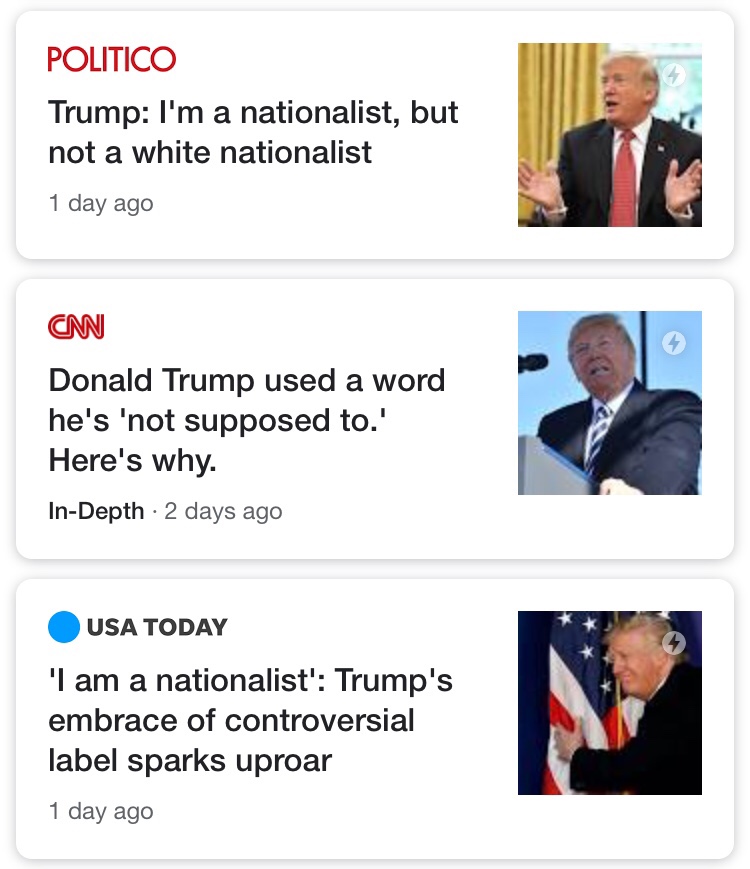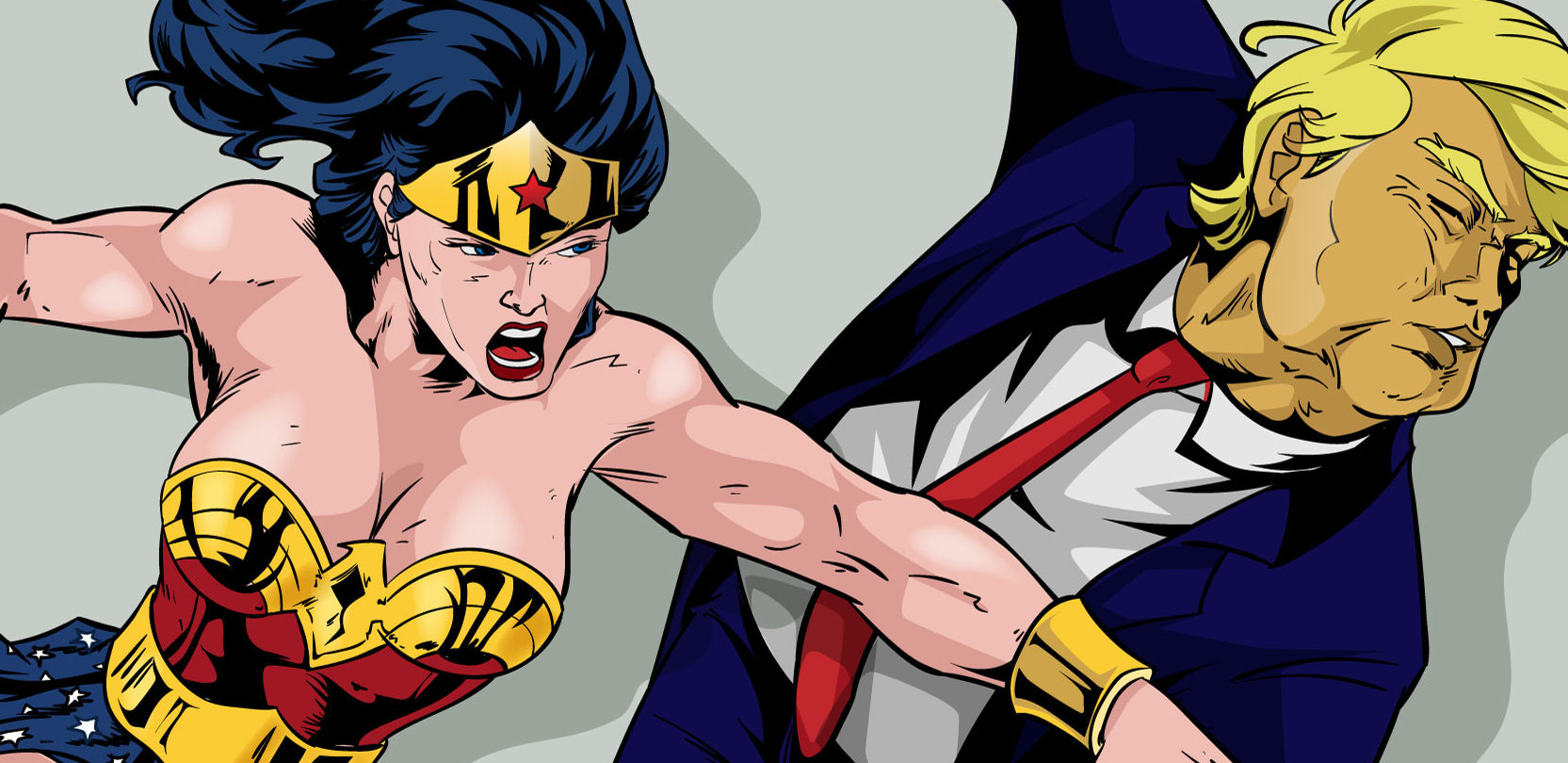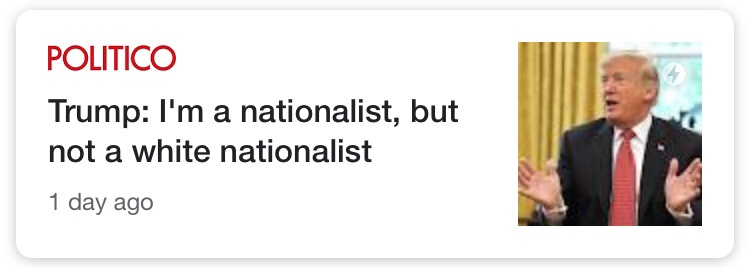Following up on Trump’s declaration that he is a “nationalist”, many are noticing that (especially coupled with Trump’s acknowledgement that he’s “not supposed to use that word”) Trump was, deliberately or otherwise, invoking white nationalism.
It’s been noticed enough that CNN White House correspondent Jim Acosta actually asked Trump if he meant to invoke white nationalism. Politico’s coverage of the Acosta-Trump exchange suggested in the headline (“Trump: I’m a nationalist, but not a white nationalist“) that Trump affirmatively denied being a white nationalist.
But Trump did no such thing. So why act like he did?
The actual exchange
I expect misleading political coverage from the usual far-right shills, and they delivered. GOPUSA suggested that Jim Acosta got “schooled” by Trump; Western Journal claimed that Trump “shut down” the “showboating” Jim Acosta; serial Trump apologist James S. Robbins wrote that Acosta “pathetically insinuated” that Trump was appealing to racists, while also dismissing the obvious racial question as “predictable progressive panic.”
But unlike these fascist propagandists, Politico seems to want to be a trustworthy news source. I’d expect them to get things right. Here’s the actual exchange, taken from The Raw Story, which also has video if you want to see/hear it yourself:
“There’s concern that you are sending coded language, or a dog whistle, to some Americans out there that what you really mean is that you’re a white nationalist,” Acosta asked.
“I’ve never even heard that. I cannot imagine,” he said. “I’ve never heard that theory about being a nationalist and I’ve heard them all,” Trump insisted. “But I’m somebody that loves our country.”
“I am very proud of our country. We cannot continue to allow what’s happened to our country to continue happening, we can’t let it happen,” he said. “So I’m proud. I’m proud of our country. And I am a nationalist,” he continued.
“It’s a word that hasn’t been used too much. Some people use it. But I’m very proud. I think it should be brought back,” he added.
The Raw Story’s headline (“Trump claims ignorance after CNN’s Jim Acosta asks him if he’s appealing to white nationalists”) is far more accurate than Politico’s. Trump claimed ignorance here, he evaded the question. He claimed that he didn’t even know “nationalist” could even mean white nationalist. Claiming ignorance allowed him to avoid answering Jim Acosta’s specific question, which was whether Trump meant “nationalist” as a dog whistle or coded message to white nationalists.
But what did Trump not do in this entire exchange? In all his rambling, Trump did not deny being a white nationalist. He just denied understanding the meaning of words.
Politico, for some bizarre reason, chose to translate that evasiveness into “I am a nationalist, but not a white nationalist.”
Headlines matter.
Language matters.
White supremacists understand this; it’s why they tried to rebrand themselves as “alt-right” and avoid “white nationalist ” or “white supremacist” terminology. The Associated Press thankfully decided in late 2016 to stop giving into their self-branding effort, only using “alt-right” within quotes or referring to them the “self-described alt-right” when they do self-describe as such.
There is a clear difference between being a white nationalist and calling yourself a white nationalist. The “self-described alt-right” understand this. They try to avoid the labels, but they’re still white nationalists or white supremacists at their core. And Trump is now buying into the “nationalist versus globalist” narrative pushed internationally by none other than Steve Bannon, the former alt-right Trump administration staffer.
Language matters when white nationalists are trying to avoid being called white nationalists. And they will notice what Trump didn’t say. They will notice that Trump didn’t deny being a white nationalist. If people who oppose white nationalists are told Trump denied being one, then Trump gets to have it both ways. Trump gets to signal to white nationalists that he’s still in their court, while avoiding the negative fallout that would come from admitting he is one.
Headlines especially matter in our current digital world, where headlines are all you see when choosing what news to read:

Trump’s lengthy run-on statements are difficult to decipher and somewhat open to interpretation, just due to their lack of grammatical coherence. That makes readers more primed than usual to accept help interpreting him. If the headline says Trump isn’t a white nationalist, and you read what Trump said, you could end up agreeing that he denied being a white nationalist (just not in so many words).
This is one of the more frustrating things about the rising tide of fascism under Trump. He gets away with saying more and signaling more, partly because his incoherence (and his willingness to contradict himself when convenient) makes him harder to pin down.
The media shouldn’t do Trump any favors here. They should be blunt and accurate about Trump’s evasiveness, especially on a topic like whether Trump supports white nationalism or white supremacy. Don’t let Trump avoid denying (or admitting) he’s a white nationalist. Make Trump answer the question, and when he doesn’t, be clear that he didn’t.

